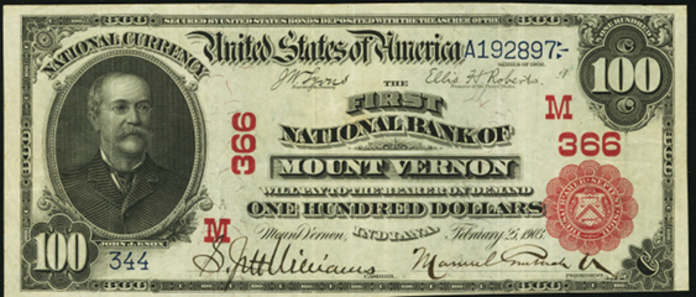One Hundred Dollar Notes › Nationals › 1902 One Hundred Dollar National Bank Notes › Wisconsin Charters › 1902 $100 Merrill Wisconsin National Bank Of Merrill
Get Value Now
| Item | Info |
|---|---|
| Series | 1902 |
| Charter | #4736 National Bank of Merrill of Merrill, Wisconsin |
| Year Chartered | 1892, 159 Banks Chartered |
| City Info | Merrill was first inhabited by the Chippewa Native Americans. The first European settlement there was a logging town named Jenny Bull Falls. By 1843 a trading post was constructed near the town; John Faely was the first settler. Within four years a dam, started by Andrew Warren, was constructed over the Wisconsin River. Warren then established the first mill powered by the dam, and other saw mills in the area. In 1870, T.B. Scott succeeded Warren, and the mill soon became increasingly successful. In 1899 the mill burned down. During that time the name of the community was changed to Merrill, in honor of S.S. Merrill, the general manager of the Chicago, Milwaukee, St. Paul, and Pacific Railroad. Source: Wikipedia |
| Similar Cities | If your note doesn't match try: 1. Merrill, Wisconsin - First National Bank 2. Merrill, Oregon - First National Bank 3. Merrill, Wisconsin - Citizens' National Bank 4. Merrill, Iowa - First National Bank |
| Seal Varieties | Red, Blue |
| Other Info | 1. Value depends on notes known for charter, condition and market demand. |
| Neat Fact | Plate letters A-C for $50 Notes, A for $100 Notes (Friedbergs, 20th Ed. P 99) |
No Obligations Offers and Appraisals
Please submit a good photo or scan. It will be identified and evaluated. Understand there may be subtle differences between the image you see above and your note. Signatures, design, markings and note condition will determine the offer price. Notes in Uncirculated or better condition receive the best offers.
Appraisals can be estimated for wholesale and retail prices. Wholesale is what dealers typically pay. Retail is what a collector might pay. Retail is slightly higher in most cases.
Please visit this page for USA Paper Money Reference. Do not treat this page as a reference guide, it is for appraisal and acquisition purposes only.
